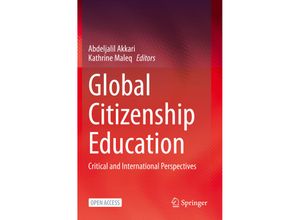This open access book takes a critical and international perspective to the mainstreaming of
the Global Citizenship Concept and analyses the key issues regarding global citizenship
education across the world. In that respect it addresses a pressing need to provide further
conceptual input and to open global citizenship agendas to diversity and indigeneity. Social
and political changes brought by globalisation migration and technological advances of the
21st century have generated a rise in the popularity of the utopian and philosophical idea of
global citizenship. In response to the challenges of today's globalised and interconnected
world such as inequality human rights violations and poverty global citizenship education
has been invoked as a means of preparing youth for an inclusive and sustainable world. In
recent years the development of global citizenship education and the building of students'
global citizenship competencies have become a focal pointin global agendas for education
international educational assessments and international organisations. However the concept of
global citizenship education still remains highly contested and subject to multiple
interpretations and its operationalisation in national educational policies proves to be
challenging. This volume aims to contribute to the debate question the relevancy of global
citizenship education's policy objectives and to enhance understanding of local perspectives
ideologies conceptions and issues related to citizenship education on a local national and
global level. To this end the book provides a comprehensive and geographically based overview
of the challenges citizenship education faces in a rapidly changing global world through the
lens of diversity and inclusiveness.

